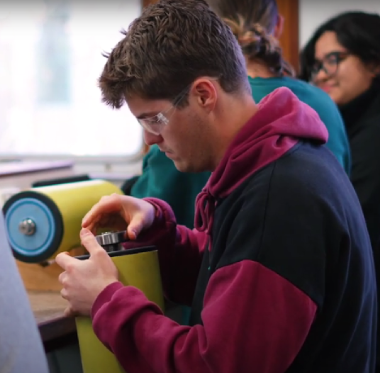Undergraduate
Electrical and Electronic Engineering
Contact us
Address
Student Central
The University of Western Australia (M355), 35 Stirling Highway, Perth, Western Australia 6009
Telephone
131 UWA (131 892)
International
(+61 8) 6488 1000
Hours
Frequently asked questions
Events you may be interested in
Show more eventsCareers and further study
This course opens up a world of future study pathways and career opportunities.
Career Pathways
- Electrical and Electronic engineer
- Researcher or consultant
- Electrical power engineer
- Communications engineer
- Embedded systems engineer
- Medical systems engineer
- Network controller
- Power systems engineer
- Systems engineer
Fees and scholarships
Scholarships
Scholarships are available to students from a diverse range of backgrounds, including academic achievement, financial need, educational disadvantage, leadership and community service, artistic or sporting achievements, and being from a rural or remote area.
Cost of living
International Student Fees
Onshore international students are charged an annual course fee, charged per credit point at a rate dependent on the course in which the student is enrolled. Annual course fees are calculated based on an annual study load. Check the handbook to confirm the annual study load for your course.
Find out more about international student tuition fees and visit the fee calculator for the relevant course fees.
Fees are subject to annual indexation.
Scholarships
Scholarships are available to students from a diverse range of backgrounds, including academic achievement, financial need, educational disadvantage, leadership and community service, artistic or sporting achievements, and being from a rural or remote area.
Cost of living
Admission requirements
The University of Western Australia welcomes applications from international and domestic school-leavers. If you’re interested in studying one of these majors, find out the admission details below.
Admission requirements
Admission Requirements
- Scaled score of at least 50 in Mathematics Methods ATAR
- Scaled score of at least one of the following three subjects*: Chemistry ATAR, Physics ATAR or Mathematics Specialist ATAR
*All three subjects are recommended. If you do not have all three, then you can use up to two of your free electives to pick up missing prerequisite knowledge in your first year.
English competency
English is the language of instruction and assessment at UWA and you will need to meet the English language requirements of the University to be eligible for a place.
Minimum overall IELTS score of 6.5, with no band less than 6.0.
How to apply
Apply through TISC
- Log in to the TISC website
If you’re a Year 12 student studying a WACE course at a WA high school or a pathway program, you are already automatically registered with TISC. - Select your preferences
You can choose up to six preferences when you apply through TISC. You should list your preferences in order from your most desired course onwards; this way you’ll have plenty of options to get into UWA. - Lodging your application
You’re almost there! After answering a few questions, you’ll need to make a declaration about your application. - Application processing fee
Your TISC application is lodged once you’ve completed the payment. For more information on fees and payments, visit the TISC website.
Course details
Electrical and electronic engineering spans from the nanometres-thick scale of advanced electronic devices to the kilometres-long scale of power transmission, and everything in between.
Our Electrical and Electronic Engineering major prepares you for a career in such innovative fields as developing sustainable energy solutions, designing technologies to improve our health, creating systems that support industry or communities, or designing electronics that transform lives.
You’ll develop the expertise to identify and solve challenges in the generation and transmission of information and electric power, and the design and testing of electrical and electronic devices, circuits and systems. You'll also consider the context of the broader system application, including economic, environmental, social, political, ethical, health and safety, manufacturability, and sustainability constraints.
Quick details
- Available
- Full-time, Part-time
- Semester 1, Semester 2
- MJD-EELEC
- 106081B
- 4-years full time
- UH011
Why study Electrical and Electronic Engineering?
- You’ll make valuable connections with UWA’s industry partners including Clough. Lycopodium, Western Power, Atlas Copco, South 32, Alcoa and other members of the electrical engineering industry advisory panel – giving your career a head start.
- You will become an industry-ready electrical and electronics engineer, opening up a world or career opportunities in innovative fields such as developing sustainable energy solutions, designing technologies to improve healthcare, creating systems that support industry or communities, or designing electronics that transform lives.
- As a UWA electronic and electrical engineering student you could spend your time working on the Renewable Energy Vehicle (REV) project or in the Robotics Lab, developing sustainable energy solutions, designing new technologies, solving detailed computer problems and working with some of the world’s best minds.
Student clubs
Whatever you’re interested in, you’ll find people here to share your journey.
Enhance your employability while making lifelong friends and connections by joining one of our many student clubs, such as:
- Electrical and Electronic Engineers of WA (EEEWA)
- The UWA Institute of Electrical and Electronic Engineers (IEEE) Student Branch
- UWA Makers
- The University Engineers' Club (UEC)
Find out more about all our student clubs from the UWA Student Guild.
You'll learn to
- Utilise advanced technical electrical and electronic engineering skills in problem identification, simplification, analysis, planning, design, implementation and operation for an exciting career in engineering
- Create innovative engineering solutions to solve complex issues by applying critical thinking skills and your knowledge of established engineering methods
- Understand and implement the mathematical foundations underlying electrical and electronic engineering concepts
- Develop a deep practical understanding of the core concepts of electrical and electronic engineering and extend this knowledge to more specialised areas such as energy systems, microelectronics, renewable energy, power engineering, signal processing
Work Experience
The Bachelor of Engineering (Honours) offers work integrated learning (WIL) opportunities where you can:
- Gain practical hands-on industry relevant experience and skills
- Bridge the gap between theory and practice
- Develop employability skills through a science work placement
As part of your studies, you will complete a 12-week practicum and professional-development experience. This can be achieved by spending at least eight weeks in an engineering environment of your choice.
Your degree options
Provisional accreditation
 The Electrical and Electronic Engineering major (MJD-EELEC) in any course leading to a Bachelor of Engineering (Honours) is provisionally accredited by Engineers Australia (EA).
The Electrical and Electronic Engineering major (MJD-EELEC) in any course leading to a Bachelor of Engineering (Honours) is provisionally accredited by Engineers Australia (EA).
Graduate with two degrees
The combined degree option allows you to pair your Bachelor of Engineering (Honours) degree with another passion, broadening your career options and giving you an edge in a rapidly changing workforce.
You can combine the Bachelor of Engineering (Honours) with:
You’ll graduate with two Bachelor degrees in just five years*, opening up a world of possible career paths while broadening your knowledge, networks and horizons.
Duration: 5 years*
ATAR: 88
Bachelor of Engineering (Honours) and Bachelor of Philosophy (Honours)
Ideal for high-achievers with a passion for engineering, this combined degree gives you the opportunity to get hands-on undergraduate research experience, one-on-one mentoring from leading academics and overseas exchange and education opportunities.
Duration: 5.5 - 6.5 years
ATAR: 98
*Chemical Engineering major will take 5.5 years to complete.
*Bachelor of Engineering (Honours) and Bachelor of Modern Languages will take 5.25 to 5.5 years to complete.




